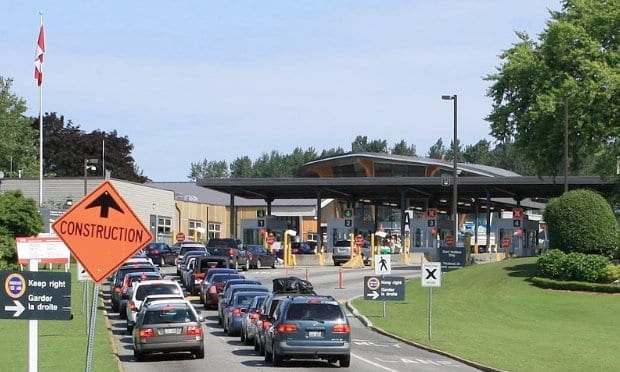Though the US Department of Homeland Security (DHS) says its policy is under review, it still won’t say whether married gay Canadian couples should be treated as married at the border, Xtra has learned.
While straight couples can fill out a single customs declaration form for the whole family when driving or flying into the United States, gay couples must rely on individual border agents to interpret the law.
The Department of Homeland Security would only tell Xtra that “the policy is currently under review by the US State Department and the Department of Homeland Security.”
The Department would not, however, say what the actual policy is. Asked by email if he knew how border guards were supposed to handle gay couples, DHS spokesman Michael Milne responded “Not at this time…”
Jerry Ritt, a father of two from Ottawa, says this gray area is not only an inconvenience but an indignity for his family.
When he and his husband flew through Los Angeles for their honeymoon in 2003, a border guard said they had to fill out two forms, even though they were married in Canada.
Once Ritt and his husband had two children they wanted to go through customs together as a family. Ritt says that meant waiting in line with his family customs form, nervously waiting to be rebuked.
The last straw came on a flight through the US on the way to a vacation in Mexico, when a border guard shouted at him in front of his daughter.
“He gave us a really hard time,” Ritt says. “He said, ‘I don’t care if you’re married, we don’t recognize that marriage.’” When Ritt asked if he or his husband should take their two children through customs, the guard became even more agitated.
“My daughter was looking at me saying, ‘What’s going on, Dad?’” Ritt says. Since then, he has not flown through the US, and does not plan to until he knows his family will be respected.
The Department of Homeland Security will not say whether Ritt’s family should be recognized at the border or not. The ambiguity remains despite dramatic changes to immigration rules since the US Supreme Court struck down sections of the Defense of Marriage Act (DOMA) in June.
In July, Homeland Security Secretary Janet Napolitano said she would direct US Citizenship and Immigration to accept applications from married gay couples. Then in August, US Secretary of State John Kerry announced that for the purposes of immigration, same-sex couples would thereafter be treated the same as any other couple.
“Now, as long as a marriage has been performed in a jurisdiction that recognizes it so that it is legal, then that marriage is valid under US immigration laws,” Kerry said. “Every married couple will be treated exactly the same.”
When Ritt heard Kerry’s announcement, he hoped it meant that border agents would also change their attitude toward gay families. But there is still no way, Xtra has discovered, to know if customs agents will recognize a Canadian gay family.
Xtra contacted border stations in nine American states bordering Canada. Answers varied widely, even though all stations are run by the same federal Department of Homeland Security.
Agents in three states, Washington, Montana and North Dakota, said couples should file customs forms separately. Agents in Maine, Vermont, New York, Michigan, Minnesota and Idaho, however, said that one form is acceptable.
One agent in Blaine, Washington said gay couples should fill out two forms “just to be on the safe side,” while another agent in International Falls, Minnesota said that one form is enough “as long as you live together.”
An agent in Eastport, Idaho, said one form is acceptable “as long as you were willing to take responsibility for each other.” Several of the agents had to put down the phone to ask a supervisor before coming to a decision.
Ritt is hopeful that border agents will soon get clear direction to recognize gay couples now that DOMA has been struck down. “With that ruling, it will change,” he says. “It’s just a matter of when and how.”
Check out more stories in Xtra‘s series on border issues:
Trans photographer alleges mistreatment at Canada-US border
Author Basil Papademos’s encounter with Canada Border Services and his award-winning erotica
Charge against website owner linked to Magnotta video raises questions about freedom of expression
Relics in Canada’s Criminal Code are still being used in strange and ‘shifting’ ways


 Why you can trust Xtra
Why you can trust Xtra


